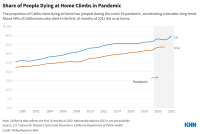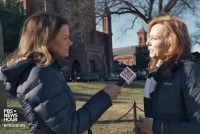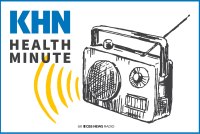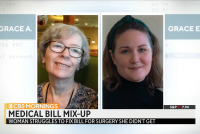Latest KFF Health News Stories
What the Health? From KFF Health News: Part I: The State of the Abortion Debate 50 Years After ‘Roe’
In Part I of this special two-part episode, Alice Miranda Ollstein of Politico, Sandhya Raman of CQ Roll Call, and Sarah Varney of KHN join KHN chief Washington correspondent Julie Rovner to discuss how the abortion debate has evolved since the Supreme Court overturned the nationwide right to abortion in 2022, and what might be the flashpoints for 2023. Also in this episode, Rovner interviews Elizabeth Nash of the Guttmacher Institute, about changing reproductive policies in the states.
More Californians Are Dying at Home. Another Covid ‘New Normal’?
The proportion of Californians dying at home, rather than in a hospital or nursing home, accelerated during the pandemic, a trend that has outlasted the rigid lockdowns linked to the initial shift.
Watch: Fifty Years after ‘Roe,’ Abortion Rights Battle Shifts to the States
On the 50th anniversary of Roe v. Wade, we asked people across the U.S. what the abrupt upending of abortion rights has meant to them, and we lay out the stakes in the battles ahead.
Watch: Anti-Abortion Activists Rally in DC in a Watershed Moment for Their Movement
Friday’s annual March for Life rally in Washington, D.C., held for the first time since Roe v. Wade was overturned, signals a new chapter in the anti-abortion movement.
The ‘KHN Health Minute’ Debuts on CBS News Radio
Launched Jan. 12, the “Health Minute” brings original health care and health policy reporting from the KHN newsroom to the airwaves each week.
The debt ceiling crisis facing Washington puts Medicare and other popular entitlement programs squarely on the negotiating table this year as newly empowered Republicans demand spending cuts. Meanwhile, as more Americans than ever have health insurance, the nation’s health care workforce is straining under the load. Joanne Kenen of the Johns Hopkins Bloomberg School of Public Health and Politico, Tami Luhby of CNN, and Victoria Knight of Axios join KHN’s chief Washington correspondent Julie Rovner to discuss these topics and more. Plus, for extra credit, the panelists recommend their favorite health policy stories of the week they think you should read, too.
What the Health? From KFF Health News: GOP House Opens With Abortion Agenda
Leaders of the new Republican-led U.S. House kicked off their legislative agenda with two bills supported by anti-abortion groups. While neither is likely to become law, the move demonstrates how abortion will continue to be an issue in Washington. Meanwhile, as open enrollment for the Affordable Care Act nears its end in most states, the number of Americans covered by the plans hits a new high. Margot Sanger-Katz of The New York Times, Alice Miranda Ollstein of Politico, and Sarah Karlin-Smith of the Pink Sheet join KHN’s Julie Rovner to discuss these topics and more. Plus, for extra credit, the panelists recommend their favorite health policy stories of the week they think you should read, too.
Bleeding and in Pain, a Pregnant Woman in Louisiana Couldn’t Get Answers
How one Louisiana woman experiencing a miscarriage sought care amid a climate of fear and confusion among doctors fueled by that state’s restrictive abortion law.
Listen: Who Investigates Suspicious Deaths in Your Community — And Why It Matters
KHN senior correspondent Samantha Young appeared on the “Apple News Today” podcast and KOA, a public radio station in Denver, to discuss the difference between coroners and medical examiners and why it matters.
In PA County Jails, Guards Use Pepper Spray and Stun Guns to Subdue People in Mental Crisis
An investigation of records from 25 county jails across Pennsylvania showed that nearly 1 in 3 “use of force” incidents by guards involved a confined person who was having a psychiatric crisis or who had a known mental illness.
What the Health? From KFF Health News: Year-End Bill Holds Big Health Changes
The year-end spending bill passed by Congress in late December contains a wide array of health-related provisions, including a structure for states to begin to disenroll people on Medicaid whose coverage has been maintained through the pandemic. Meanwhile, the Biden administration is taking steps to make the abortion pill more widely available. Joanne Kenen of the Johns Hopkins Bloomberg School of Public Health and Politico, Rachel Cohrs of Stat, and Rachel Roubein of The Washington Post join KHN’s chief Washington correspondent Julie Rovner to discuss these topics and more. Also this week, Rovner interviews Mark Kreidler, who reported and wrote the latest KHN-NPR “Bill of the Month” feature about a billing mix-up that took about a year to sort out.
Watch: Patient Sent to Collections for Surgery She Never Had
KHN Editor-in-Chief Elisabeth Rosenthal joins “CBS This Morning” to discuss how difficult a clerical error can be to fix and how patients can respond if it happens to them.
‘An Arm and a Leg’: The Year in Review, From Prenatal Testing to Insulin Pricing
The editorial team of “An Arm and a Leg” looks back on the reporting that hit close to home over the past year, including insulin pricing and prenatal testing.
Seasonal Cooks’ Secret Sauce: Heaping Nutrition and Cultural Zest
Two “nutrition ambassadors” from Oldways, an organization that makes tradition and pride centerpiece ingredients in food education, invite KHN into their kitchens for a peek at A Taste of African Heritage dishes to accompany holiday celebrations.
KHN’s ‘What the Health?’: The Covid Response Coordinator Speaks
In this special episode of KHN’s “What the Health?” Dr. Ashish Jha, the White House coronavirus response coordinator, talks with host Julie Rovner, KHN’s chief Washington correspondent, about where we are in the pandemic and how we should transition out of the public health emergency. This episode was taped on Dec. 20.
‘An Arm and a Leg’: Getting Insurance to Pay for Oral Surgery Is Like Pulling Teeth
A car crash left a woman in need of oral surgery, but her health insurance wouldn’t cover it. Her ongoing fight shows podcast host Dan Weissmann the weird way insurance treats teeth and reveals a big problem in the Obamacare marketplace.
Hundreds of Hospitals Sue Patients or Threaten Their Credit, a KHN Investigation Finds. Does Yours?
An examination of billing policies and practices at more than 500 hospitals across the country shows widespread reliance on aggressive collection tactics.
Inside a Children’s Hospital: Struggling to Cope With a Surge of Respiratory Illness
Pediatric cases of RSV and flu have families crowding into ERs, as health systems juggle staff shortages. In Michigan, only 10 out of 130 hospitals have a pediatric ICU.
After Tuition, Books, and Room and Board, Colleges’ Rising Health Fees Hit a Nerve
Many colleges require students to have health insurance coverage, and the college option can be costly. In addition, some schools mandate that students pay a fee to cover health services on campus.
KHN’s ‘What the Health?’: Health Spending? Only Congress Knows
Top negotiators in Congress have agreed to a framework for government spending into next year, but there are details to iron out before a vote — such as the scheduled Medicare payment cuts that have providers worried. Also, the Biden administration reopens its program allowing Americans to request free covid-19 home tests, as hopes for pandemic preparedness measures from Congress dim. Rachel Cohrs of Stat, Alice Miranda Ollstein of Politico, and Rebecca Adams of KHN join KHN’s Mary Agnes Carey to discuss these topics and more. Plus, for extra credit, the panelists recommend their favorite health policy stories of the week they think you should read, too.




















